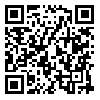
 , Hassan Asilian Mahabadi *
, Hassan Asilian Mahabadi * 
 1, Seyedeh Monavar Yazdi2
1, Seyedeh Monavar Yazdi2 
 , Ebrahim Hajizadeh3
, Ebrahim Hajizadeh3 
 , Ali Nahvi4
, Ali Nahvi4 

2- Department of Psychology, Faculty of Education and Psychology, Alzahra University, Tehran, Iran.
3- Department of Biostatistics, Faculty of Mathematical Sciences, Tarbiat Modares University, Tehran, Iran.
4- Department of Mechatronics, Faculty of Electrical Engineering, K.N. Toosi University of Technology, Tehran, Iran.
Objectives: Most studies have performed to identify the affective variables in using mobile phone by drivers based on interview and questionnaire. In this study call answering rate while driving was investigated in a sample of male postgraduate students of a university in Tehran by a driving simulator.
Methods: Six driving scenario designed differing in risk of driving. Answer rate to mobile phone calls during observation of driving scenarios were recorded.
Results: Logistic regression models revealed that participants perceived two-way roads and high speeds more risky than one-way roads and low speeds. Also, results indicated that decision to answer to calls while driving is ruled by personality trait than difficulty of driving scenario or age.
Discussion: drivers in all ages and experiences and different driving scenarios may decide to start answering mobile phone while driving. Traffic safety campaigns against using mobile phones on roads should be focused on personality trait of drivers.
Received: 2011/12/3 | Accepted: 2012/01/10 | Published: 2012/02/1
| Rights and permissions | |
 |
This work is licensed under a Creative Commons Attribution-NonCommercial 4.0 International License. |
